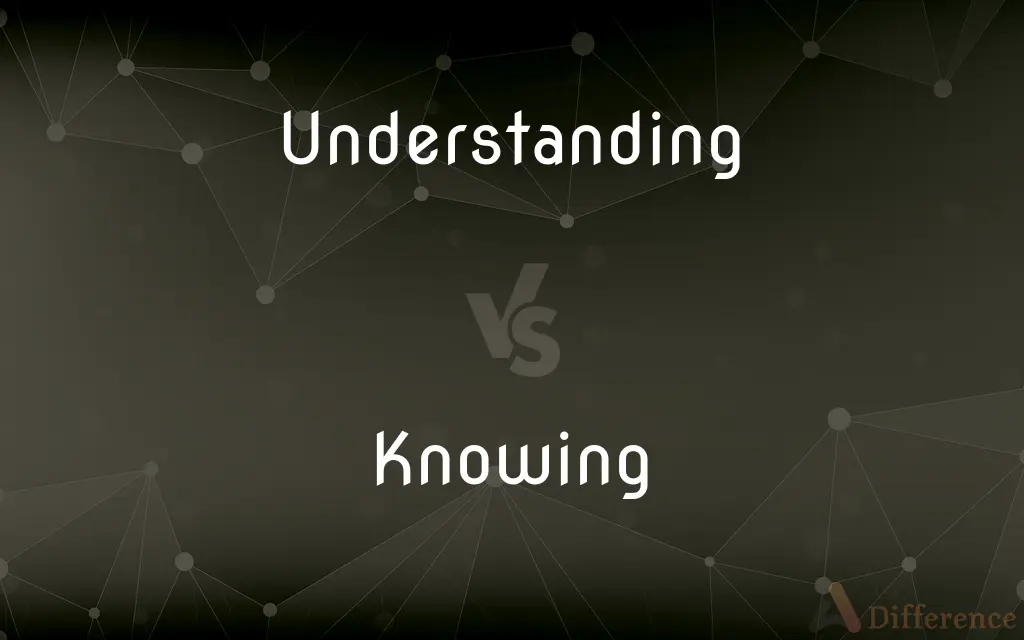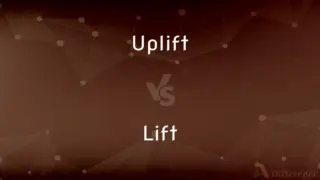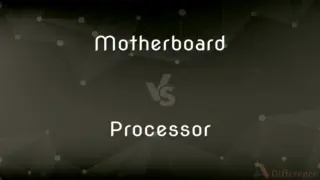Understanding vs. Knowing — What's the Difference?
By Fiza Rafique & Urooj Arif — Updated on March 15, 2024
Understanding involves comprehending the meaning or principles behind something, often implying depth, whereas knowing refers to being aware of or familiar with facts or information.

Difference Between Understanding and Knowing
Table of Contents
ADVERTISEMENT
Key Differences
Understanding and knowing, while closely related, serve different roles in the acquisition and application of knowledge. Understanding is the deeper comprehension of how and why things are. It involves grasping the underlying principles, relationships, and complexities of a subject, allowing for the application of knowledge in various contexts and the ability to adapt this knowledge to solve new problems. On the other hand, knowing is the possession of information or facts about something. It denotes awareness or familiarity but does not necessarily imply an in-depth grasp of the underlying principles or the ability to apply the knowledge creatively.
When someone understands a concept, they can explain it in their own words, make connections with other concepts, and apply it in different situations. For example, understanding mathematics allows a person to solve problems beyond the ones they have memorized solutions for, by applying underlying principles. Whereas, knowing might simply mean being able to recall mathematical formulas without necessarily comprehending their derivation or application in varying contexts.
Understanding requires critical thinking and often evolves from knowing. Initially, one may know the facts or steps (knowing), but through analysis, reflection, and application, these facts can be woven into a coherent whole (understanding). This process is evident in learning environments where the goal is to move beyond rote memorization to a deeper comprehension that enables application, analysis, synthesis, and evaluation.
In many fields, especially those involving complex systems or abstract concepts such as philosophy, mathematics, or the sciences, understanding is crucial for innovation and problem-solving. It allows individuals to navigate new challenges using the principles they have internalized. Conversely, knowing provides the foundation upon which understanding is built, serving as the necessary first step in the journey toward deep comprehension.
The distinction between understanding and knowing is also significant in everyday interactions and learning. Effective communication relies on not just knowing words but understanding their meanings and nuances. Similarly, effective teaching goes beyond transferring information to facilitating a deep understanding among learners.
ADVERTISEMENT
Comparison Chart
Definition
Deep comprehension of principles and relationships.
Awareness or familiarity with facts or information.
Focus
Why and how things are; the underlying logic.
The what; the facts or data.
Application
Enables problem-solving and adaptation in various contexts.
Often limited to specific contexts where facts apply.
Process
Requires critical thinking, analysis, and synthesis.
Involves memorization or acquisition of information.
Outcome
Ability to explain, connect, and apply concepts creatively.
Ability to recall or recognize specific pieces of information.
Importance
Essential for innovation, problem-solving, and adaptation.
Provides the foundation for understanding.
Example
Understanding physics principles to solve novel problems.
Knowing the formula for gravity.
Compare with Definitions
Understanding
Comprehension that enables creativity and adaptation.
His deep understanding of historical events led to insightful comparisons with current affairs.
Knowing
Being aware of or having information about something.
Knowing the capitals of all countries made him a champion in geography quizzes.
Understanding
Reflects a synthesis of knowledge and insight.
Through understanding, she could explain complex ideas in simple terms.
Knowing
Foundation for developing understanding.
Knowing basic facts about a subject is the first step toward a deeper understanding.
Understanding
Involves recognizing patterns, principles, and relationships.
Their understanding of economic theories facilitated predictions about market trends.
Knowing
Can be specific and discrete, often easily tested.
Knowing the date of an event is simpler than understanding its impact.
Understanding
Grasping the meaning, significance, or nature of something.
He had a thorough understanding of the physics concept, allowing him to apply it in new situations.
Knowing
Possession of facts or details without deep comprehension.
She knew the chemical formula but couldn't explain its significance.
Understanding
The ability to relate and apply concepts in various contexts.
Her understanding of mathematical principles made her adept at solving complex problems.
Knowing
Familiarity or awareness gained through experience or study.
After years of study, he knew many languages but understood the culture of only a few.
Understanding
Understanding is a psychological process related to an abstract or physical object, such as a person, situation, or message whereby one is able to use concepts to model that object. Understanding is a relation between the knower and an object of understanding.
Knowing
Possessing knowledge, information, or understanding
Very knowing about transportation costs.
Understanding
The ability by which one understands; intelligence
Concepts that are beyond the understanding of a child.
Knowing
Showing clever awareness and resourcefulness; shrewd and worldly
"Even so knowing a young ruffian as William Chaloner would have had no preparation for the shock of London" (Thomas Levenson).
Understanding
The quality or condition of one who understands; comprehension
Do you have much understanding of calculus?.
Knowing
Suggestive of secret or private knowledge
A knowing glance.
Understanding
Individual or specified judgment or outlook; opinion
In my understanding, this is a good plan.
Knowing
Deliberate; conscious
A knowing attempt to defraud.
Understanding
A usually implicit agreement between two or more people or groups
An understanding between neighbors over late-night noise.
Knowing
(Archaic) Fashionable; stylish
"Many young men ... drove about town in very knowing gigs" (Jane Austen).
Understanding
A disposition to appreciate or share the feelings and thoughts of others; sympathy
Can't you show some understanding for the poor child?.
Knowing
Possessing knowledge or understanding; knowledgeable, intelligent.
Understanding
Characterized by or having good sense or compassion
An understanding teacher.
Knowing
Deliberate, wilful.
Understanding
The act of one that understands or comprehends; comprehension; knowledge; discernment.
Knowing
Shrewd or showing clever awareness; discerning.
A knowing rascal
Understanding
(countable) Reason or intelligence, ability to grasp the full meaning of knowledge, ability to infer.
Knowing
Demonstrating knowledge of what is in fashion; stylish, chic.
Understanding
(countable) Opinion, judgement or outlook.
According to my understanding, the situation is quite perilous. I wonder if you see it this way, too.
Knowing
The ability to know something without being taught.
Understanding
(countable) An agreement of minds; harmony; something mutually understood or agreed upon.
Knowing
Suggestive of private knowledge or understanding.
Understanding
An informal contract; mutual agreement.
I thought we had an understanding - you do the dishes, and I throw the trash.
Knowing
Given my knowledge about someone or something.
Knowing you, you would try not to be late for school.
Understanding
A reconciliation of differences.
The parties of the negotiation have managed to come to an understanding.
Knowing
Present participle of know
Understanding
(uncountable) Sympathy.
He showed much understanding for my problems when he heard about my past.
Knowing
The act or condition of having knowledge.
Understanding
Showing compassion, tolerance, and forbearance.
Knowing
Skilful; well informed; intelligent; as, a knowing man; a knowing dog.
The knowing and intelligent part of the world.
Understanding
(dated) Knowing; skilful.
Knowing
Artful; cunning; as, a knowing rascal.
Understanding
Present participle of understand
Knowing
Knowledge; hence, experience.
This sore nightHath trifled former knowings.
Understanding
Knowing; intelligent; skillful; as, he is an understanding man.
Knowing
Clear and certain mental apprehension
Understanding
The act of one who understands a thing, in any sense of the verb; knowledge; discernment; comprehension; interpretation; explanation.
Knowing
Evidencing the possession of inside information
Understanding
An agreement of opinion or feeling; adjustment of differences; harmony; anything mutually understood or agreed upon; as, to come to an understanding with another.
He hoped the loyalty of his subjects would concur with him in the preserving of a good understanding between him and his people.
Knowing
By conscious design or purpose;
Intentional damage
A knowing attempt to defraud
A willful waste of time
Understanding
The power to understand; the intellectual faculty; the intelligence; the rational powers collectively conceived an designated; the higher capacities of the intellect; the power to distinguish truth from falsehood, and to adapt means to ends.
But there is a spirit in man; and the inspiration of the Almighty giveth them understanding.
The power of perception is that which we call the understanding. Perception, which we make the act of the understanding, is of three sorts: 1. The perception of ideas in our mind; 2. The perception of the signification of signs; 3. The perception of the connection or repugnancy, agreement or disagreement, that there is between any of our ideas. All these are attributed to the understanding, or perceptive power, though it be the two latter only that use allows us to say we understand.
In its wider acceptation, understanding is the entire power of perceiving an conceiving, exclusive of the sensibility: the power of dealing with the impressions of sense, and composing them into wholes, according to a law of unity; and in its most comprehensive meaning it includes even simple apprehension.
Knowing
Alert and fully informed;
Politically aware
A knowing collector of rare books
The most...technically aware of the novelists under thirty
Surprisingly knowledgeable about what was going on
Understanding
Specifically, the discursive faculty; the faculty of knowing by the medium or use of general conceptions or relations. In this sense it is contrasted with, and distinguished from, the reason.
I use the term understanding, not for the noetic faculty, intellect proper, or place of principles, but for the dianoetic or discursive faculty in its widest signification, for the faculty of relations or comparisons; and thus in the meaning in which "verstand" is now employed by the Germans.
Knowing
Highly educated; having extensive information or understanding;
An enlightened public
Knowing instructors
A knowledgeable critic
A knowledgeable audience
Understanding
The cognitive condition of someone who understands;
He has virtually no understanding of social cause and effect
Understanding
The statement (oral or written) of an exchange of promises;
They had an agreement that they would not interfere in each other's business
There was an understanding between management and the workers
Understanding
An inclination to support or be loyal to or to agree with an opinion;
His sympathies were always with the underdog
I knew I could count on his understanding
Understanding
The capacity for rational thought or inference or discrimination;
We are told that man is endowed with reason and capable of distinguishing good from evil
Understanding
Characterized by understanding based on comprehension and discernment and empathy;
An understanding friend
Common Curiosities
How do understanding and knowing differ in education?
In education, knowing focuses on the acquisition of facts, while understanding emphasizes the comprehension and application of concepts in various contexts.
Why is understanding considered deeper than knowing?
Understanding is considered deeper because it encompasses not just the awareness of facts but also the comprehension of their broader implications and applications.
What is knowing?
Knowing refers to being aware of or familiar with specific facts or information about a subject.
How does understanding impact problem-solving?
Understanding enables individuals to apply principles to novel situations, thereby enhancing their ability to solve problems creatively and effectively.
What is understanding?
Understanding is the deep comprehension of the principles, relationships, and complexities of a subject, allowing for creative application and problem-solving.
How can one develop a deeper understanding of a subject?
Developing a deeper understanding involves engaging with the material critically, seeking connections between concepts, and applying knowledge in various situations to gain insights.
Can you have knowing without understanding?
Yes, it's possible to know facts without understanding the underlying principles or how to apply them creatively.
What role does understanding play in innovation?
Understanding plays a crucial role in innovation by allowing individuals to apply foundational principles in new and creative ways to solve problems or create something novel.
Is it possible to achieve understanding without first knowing?
Generally, knowing is a prerequisite for understanding, as it provides the foundational facts from which deeper comprehension is developed.
How can teachers move students from knowing to understanding?
Teachers can facilitate this transition by encouraging critical thinking, application in various contexts, and reflection on the connections between concepts.
Share Your Discovery

Previous Comparison
Uplift vs. Lift
Next Comparison
Motherboard vs. ProcessorAuthor Spotlight
Written by
Fiza RafiqueFiza Rafique is a skilled content writer at AskDifference.com, where she meticulously refines and enhances written pieces. Drawing from her vast editorial expertise, Fiza ensures clarity, accuracy, and precision in every article. Passionate about language, she continually seeks to elevate the quality of content for readers worldwide.
Co-written by
Urooj ArifUrooj is a skilled content writer at Ask Difference, known for her exceptional ability to simplify complex topics into engaging and informative content. With a passion for research and a flair for clear, concise writing, she consistently delivers articles that resonate with our diverse audience.
















































